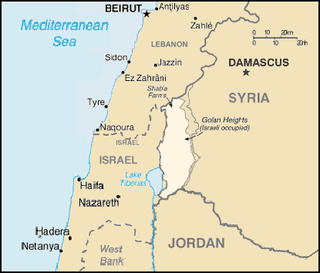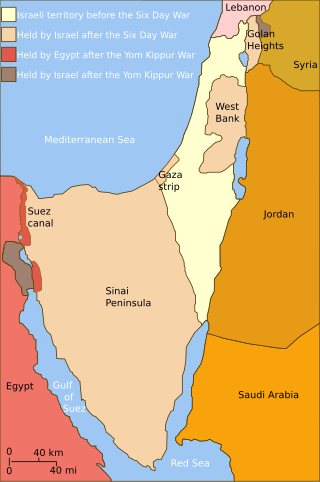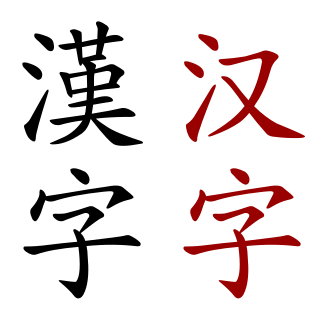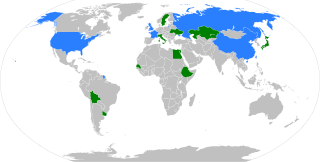A United Nations General Assembly resolution is a decision or declaration voted on by all member states of the United Nations in the General Assembly.

United Nations Security Council resolution 497, adopted unanimously on 17 December 1981, declared that the Israeli Golan Heights Law, which effectively annexed the Golan Heights, is "null and void and without international legal effect" and further calls on Israel to rescind its action.

United Nations Security Council Resolution 452, adopted on 20 July 1979, addressed the issue of the Israeli settlements in Jerusalem, the West Bank, Gaza Strip and the Golan Heights, specifically the illegality thereof. It states that "the policy of Israel in establishing settlements in the occupied Arab territories has no legal validity and constitutes a violation of the [Fourth] Geneva Convention relative to the Protection of Civilian Persons in Time of War, of 12 August 1949" and "calls upon the Government and people of Israel to cease, on an urgent basis, the establishment, construction and planning of settlements in the Arab territories occupied since 1967, including Jerusalem."

The United Nations Security Council veto power is the power of the five permanent members of the UN Security Council to veto any decision other than a "procedural" decision.

United Nations Security Council Resolution 339 was adopted on 23 October 1973 in order to bring a ceasefire in the Yom Kippur War where Resolution 338 two days before had failed.

United Nations Security Council Resolution 350, adopted on 31 May 1974, established the United Nations Disengagement Observer Force, to monitor the ceasefire between Israel and Syria in the wake of the Yom Kippur War. UNDOF was initially established for a period of six months, but has had its mandate renewed by subsequent resolutions.

United Nations Security Council Resolution 345, adopted on January 17, 1974, after a resolution from the General Assembly, the Council decided to expand the working languages of the Security Council to include Chinese. Along with Chinese, the other four working languages of the council were English, French, Russian and Spanish.

United Nations Security Council resolution 496, adopted unanimously on 15 December 1981, after hearing representations from the Seychelles, the Council condemned the recent coup attempt in the country by foreign mercenaries, including Mike Hoare, allegedly backed by South Africa, and the subsequent hijacking of an Air India plane, on 25 November 1981.

United Nations Security Council resolution 507, was adopted unanimously on 28 May 1982, after examining a report by the Security Council Commission on the Seychelles adopted in Resolution 496 (1981), the Council expressed its concern at the November 1981 coup attempt in the Seychelles by foreign mercenaries, including Mike Hoare, allegedly backed by South Africa, and the subsequent hijacking of an Air India plane.

United Nations Security Council resolution 1053, adopted unanimously on 23 April 1996, after recalling all previous resolutions on Rwanda, particularly resolutions 918 (1994), 997 (1995), 1011 (1995) and 1013 (1995), the Council reviewed the findings of the Commission of Inquiry concerning violations of the arms embargo against former Rwandan government forces.

United Nations Security Council Resolution 1918, adopted unanimously on April 27, 2010, after recalling resolutions 1814 (2008), 1816 (2008), 1838 (2008), 1844 (2008), 1846 (2008), 1851 (2008) and 1897 (2008) on Somalia, the Council called on countries to criminalise piracy within their national laws.

United Nations Security Council resolution 1333, adopted on 19 December 2000, after recalling all resolutions on the situation in Afghanistan, including Resolution 1267 (1999), called for a ban of military assistance to the Taliban, closure of its camps and an end to the provision of sanctuary of the movement.

United Nations Security Council Resolution 1950, adopted unanimously on November 23, 2010, after recalling previous resolutions on the situation in Somalia, including resolutions 1814 (2008), 1816 (2008), 1838 (2008), 1844 (2008), 1846 (2008), 1851 (2008), 1897 (2009) and 1918 (2010); the Council re-authorised states to intervene in acts of piracy by Somali pirates at sea for a further period of twelve months.

United Nations Security Council Resolution 1976 was adopted unanimously on 11 April 2011. After recalling previous resolutions on the situation in Somalia, particularly resolutions 1918 (2010) and 1950 (2010), the Council decided to consider the establishment of special Somali courts to try pirates operating off the coast of the country.

United Nations Security Council Resolution 2015 was unanimously adopted on 24 October 2011.

The 2016 United Nations Security Council election was held on 28 June during the 70th session of the United Nations General Assembly, held at United Nations Headquarters in New York City. The elections were for five non-permanent seats on the UN Security Council for two-year mandates commencing on 1 January 2017. In accordance with the Security Council's rotation rules, whereby the ten non-permanent UNSC seats rotate among the various regional blocs into which UN member states traditionally divide themselves for voting and representation purposes, the five available seats were allocated as follows:

United Nations Security Council resolutions are United Nations resolutions adopted by the fifteen members of the Security Council (UNSC); the United Nations (UN) body charged with "primary responsibility for the maintenance of international peace and security".















